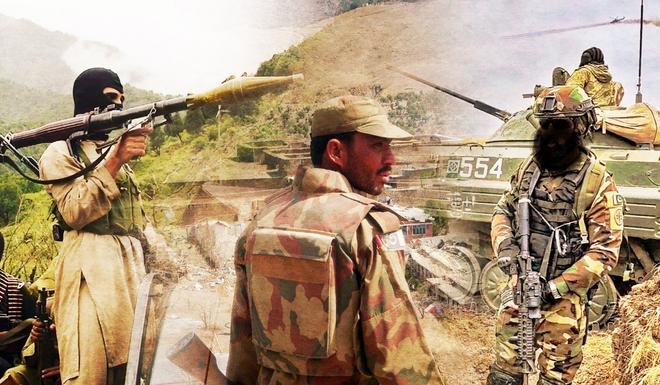Published 15:43 IST, July 4th 2024
Political Fragmentation Shadows Pakistan's New Military Offensive Against TTP
Pakistan announced Op Azm-e-Ishtekam, a military offensive targeting the resurgence of the Tehrik-i-Taliban Pakistan (TTP), bypassing parliamentary approval.

Islamabad: On 22 June 2024, Pakistan announced Operation Azm-e-Ishtekam, a renewed military offensive aimed at curbing the resurgence of the Tehrik-i-Taliban Pakistan (TTP), without parliamentary consent. This declaration has exposed deep divisions within the country's political landscape, underscoring a fragmented approach to combating terrorism.
The TTP's resurgence represents a significant setback for Pakistan, undermining the successes of previous military operations like Zarb-e-Azb and Radd-ul-Fasaad. By 2020, the TTP was weakened by the Pakistan Army’s Operation Zarb-e-Azb, which disrupted the group's operations in North Waziristan, causing internal strife and forcing members to flee to Afghanistan. The relative calm following Zarb-e-Azb and the urban-focused Operation Radd-ul-Fasaad crippled the TTP’s infrastructure and finances. However, the militant group has since regrouped, escalating attacks, particularly in Khyber Pakhtunkhwa (KP) and Balochistan. In 2023, the TTP announced the creation of three new ‘administrative units’ for the Baloch-dominated Kalat and Makran regions and for south and north Punjab. This expansion brought the total number of TTP administrative units in Pakistan to 12, with seven in Khyber Pakhtunkhwa, one in Gilgit-Baltistan, and two each in Balochistan and Punjab. The TTP keeps adding new groups to its fold. Recently, a Pakistani militant group led by commander Yasir Dawar joined them, making it the 28th merger since July 2020. In May 2023 alone, the TTP carried out 76 attacks nationwide, the highest in eight years. This resurgence is attributed to ineffective governance, political instability, and the complex relationship between the TTP and the Pakistan Tehreek-e-Insaf (PTI) party.
Political Divisions on Operation Approval
Operation Azm-e-Ishtekam's approval has become a contentious issue among Pakistan's political parties. The ruling Pakistan Muslim League-Nawaz (PML-N) supports the military action, pressured by China over security threats to CPEC projects and the need to secure investments for the second phase of CPEC. However, opposition parties, particularly the PTI, Awami National Party (ANP), and JUI-F have expressed reservations, arguing that military operations alone cannot address the underlying issues of extremism and militancy. They also cite the lack of parliamentary consent as a significant concern.

This divide raises questions about the operation's effectiveness, as political consensus is crucial for strategic coherence in tackling the TTP threat. The PTI’s stance is particularly scrutinized, given its previous negotiations with the TTP.
The PTI-led government in KP previously engaged in dialogue with the TTP to ease regional tensions. This peace deal has been criticized for allowing the militant group to regroup and strengthen. Critics argue that leniency, coupled with inadequate counter-terrorism measures, has emboldened the TTP. Sources indicate that the PTI-TTP agreement was intended to stabilize KP, and data from SATP shows that only 258 people died from 2018-2022 compared to 297 fatalities in 2023 alone, following the breakdown of the ceasefire and the PTI government's ousting. Defense Minister Khawaja Asif noted that 5,000-6,000 TTP fighters were granted shelter and amnesty during the PTI regime, highlighting the complexities and long-term repercussions of negotiating with militant groups on national security.
The Role of Pakistan’s Political System
The recurring TTP threat highlights deeper issues within Pakistan's political system. Chronic political instability, frequent government changes, and a lack of cohesive policy direction have hampered counter-terrorism efforts. Militant groups exploit these political weaknesses, leading to periodic resurgences.
Inter-party rivalries and the politicization of military operations have often distracted from the primary goal of eradicating terrorism. This fragmented approach weakens Pakistan's defence against militancy and erodes public trust in the government's ability to ensure security and stability.

The increasing insurgency led by the TTP has seen significant participation from the Pashtun community, driven by long-standing grievances and a quest for rights and recognition. This insurgency is rooted in historical and socio-economic issues faced by the Pashtuns in Pakistan. According to the South Asia Terrorism Portal, a substantial number of TTP fighters are Pashtun, with estimates suggesting that over 60% of TTP’s core leadership and operatives hail from this ethnic group. This disproportionate representation reflects deep-seated frustrations over political marginalization, economic deprivation, and the impact of military operations in Pashtun-dominated regions such as the Federally Administered Tribal Areas (FATA) and Khyber Pakhtunkhwa (KP).
The Pashtun Tahafuz Movement (PTM), a non-violent civil rights movement, has highlighted numerous human rights violations against Pashtuns, including extrajudicial killings, enforced disappearances, and systemic discrimination. These grievances have fueled radicalization among some Pashtuns, leading them to join the TTP, which promises to fight for their rights and autonomy. A report by the Pakistani Institute for Peace Studies (PIPS) noted a 20% increase in TTP recruitment from Pashtun regions following intensified military operations in North Waziristan in 2014.
The economic plight of the Pashtuns further exacerbates the issue. KP and FATA regions lag in key socio-economic indicators compared to other provinces. As per the Pakistan Bureau of Statistics, the literacy rate in FATA is 33.3%, significantly lower than the national average of 59.1%. Unemployment and poverty rates are also disproportionately high, fostering a sense of disenfranchisement. The combination of socio-economic challenges, political marginalization, and human rights abuses has created a fertile ground for the TTP to recruit Pashtuns.
Updated 15:43 IST, July 4th 2024


